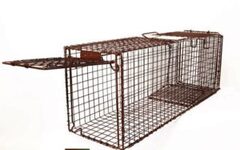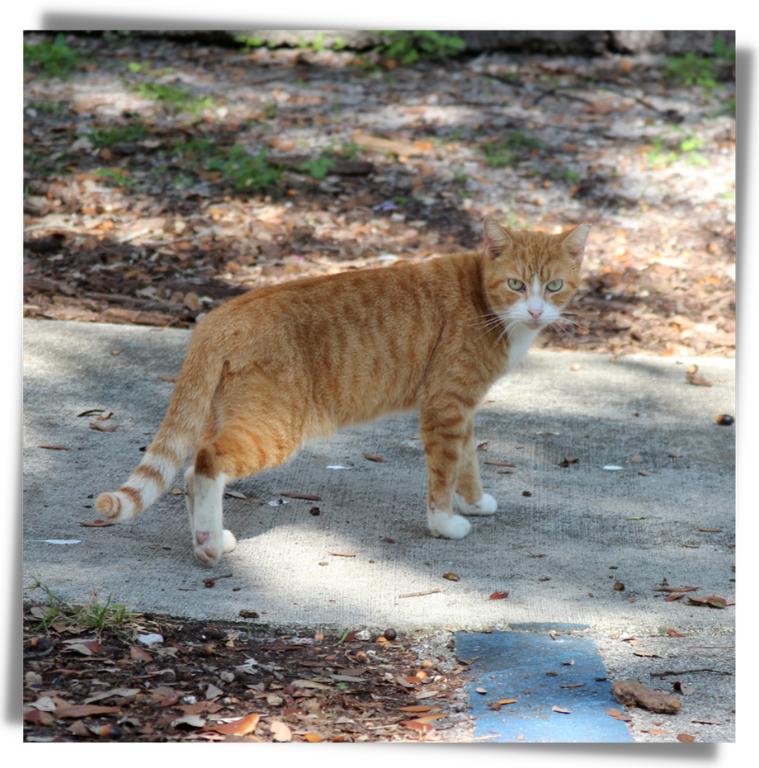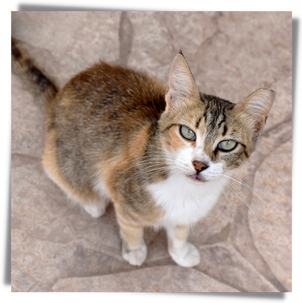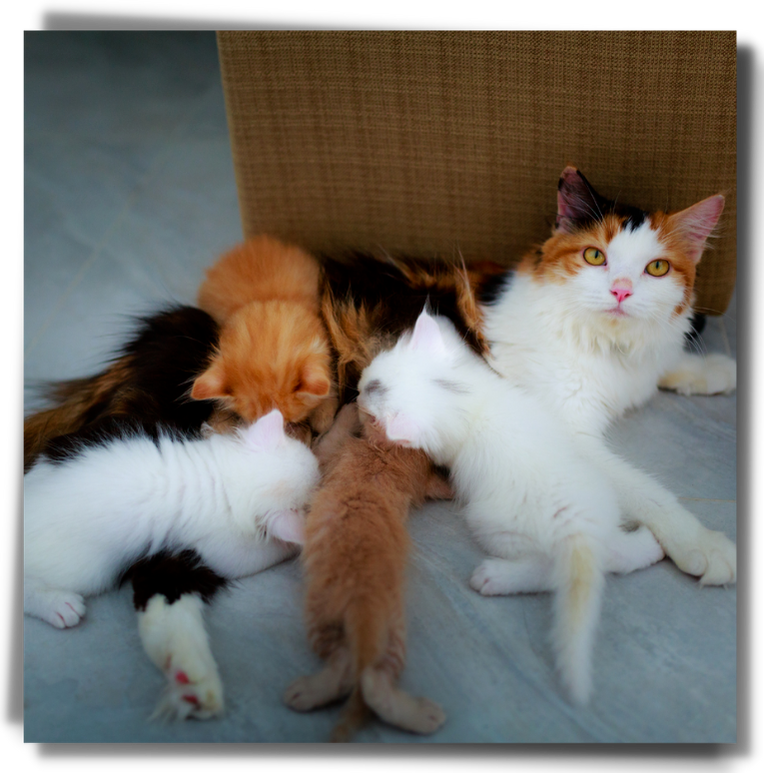Feral Cat Program Highlights
- Appointments are REQUIRED.
- Feral appointments can be requested through our normal scheduling process: See here.
- Limited spots are available for feral cats each week.
- Cats MUST LIVE OUTDOORS PERMANENTLY
- $35 Package includes:
- Spay/neuter
- Rabies Vaccine
- Ivermectin (Dewormer)
- Left Ear Tip (REQUIRED)
- Cats must arrive in an appropriately sized humane live trap (31" L x 9" W x 11" H); Please NO squirrel or fox traps. See photo under "More Details" below
- Please review our check-in and feral cat post-op procedures prior to arriving to your appointment.
MORE DETAILS:
The PAWS Clinic offers a package for “community” (stray/feral) cats that live outside full time now, and will be returned to live outside once surgery is completed. The package includes spay or neuter surgery, a rabies vaccine (age appropriate) and injection of ivermectin for deworming, and an eartip. This package is normally $35, but we sometimes have funding available to subsidize this fee.
To receive community cat pricing, all of the following requirements must be met:
1. Cats must live outdoors full time. This can be any cat that is truly feral (wild, usually unable to be handled), a friendly stray, or a barn cat. Cats that were born outside that are now house cats, or which you plan to bring inside and find a home for, do not qualify for the community cat package.
2. Cats must arrive and depart The PAWS Clinic in a humane live trap (regular cat carriers or anything other than a humane live trap are not acceptable) with only one cat per trap – NO EXCEPTIONS!!!
We will not transfer cats from carriers to traps, and we do not permit clients to transfer cats from carriers to traps on our premises, including the parking lot. If you bring a non-feral cat in a live trap without an appointment, the cat will be declined for surgery that day and you will be requested to make an appointment on another day. You may not leave and return with the cat in a live trap that day.
When you arrive:
Patient admission for the day begins at 8am. Upon arrival, please call 734-388-8641 (this number will also be posted on a sign outside the building) to check in. Please wait on hold until one of our staff members checks you in. We process these calls in the order they are received. Do not hang up or you will be placed at the end of the call list when you call back. We will ask for your cell phone number, pets name, and model/color of your car to add you to our electronic wait list. See full check-in process here.
To receive community cat pricing, all of the following requirements must be met:
1. Cats must live outdoors full time. This can be any cat that is truly feral (wild, usually unable to be handled), a friendly stray, or a barn cat. Cats that were born outside that are now house cats, or which you plan to bring inside and find a home for, do not qualify for the community cat package.
2. Cats must arrive and depart The PAWS Clinic in a humane live trap (regular cat carriers or anything other than a humane live trap are not acceptable) with only one cat per trap – NO EXCEPTIONS!!!
We will not transfer cats from carriers to traps, and we do not permit clients to transfer cats from carriers to traps on our premises, including the parking lot. If you bring a non-feral cat in a live trap without an appointment, the cat will be declined for surgery that day and you will be requested to make an appointment on another day. You may not leave and return with the cat in a live trap that day.
When you arrive:
Patient admission for the day begins at 8am. Upon arrival, please call 734-388-8641 (this number will also be posted on a sign outside the building) to check in. Please wait on hold until one of our staff members checks you in. We process these calls in the order they are received. Do not hang up or you will be placed at the end of the call list when you call back. We will ask for your cell phone number, pets name, and model/color of your car to add you to our electronic wait list. See full check-in process here.
Notes on traps and trapping:
- The live trap must be big enough so that the cat can comfortably turn around and lie down.
- Do not leave the trap unattended overnight, ESPECIALLY IN COLD OR INCLEMENT WEATHER.
- Immediately cover a trapped cat with a sheet or towel and move them to a sheltered area. Leave the cover in place while you are transporting them to the clinic. This significantly reduces stress on the cat. However, you should remove the trap cover prior to bringing the cat into the clinic, due to COVID-19. We will cover the trap with one of our covers.
- Do not attempt to transfer a cat from a live trap to a cage or a regular cat carrier. You risk serious injury to yourself and the cat by doing this. If you are not able to immediately bring a trapped cat to The PAWS Clinic, leave her in the trap and cover the trap with a sheet or towel. Move the trap to a quiet place, out of the elements, until the clinic is able to accept the cat for surgery.
- The only items allowed in the trap (except the cat, of course!) are newspaper, pee-pads, and a small DISPOSABLE food dish. Please take any towels/covers you bring with you upon drop-off. We will try to return covers or dishes left with us, but if soiled they may be disposed of.
- One community cat/household will be accepted Mondays only, no exceptions! Please call the clinic for further information.
- Cats will receive a rabies vaccine (age appropriate) and an ear tip – no exceptions!!
- Cats must arrive at the clinic at 8am. If you cannot be at the clinic by 8am, please do not set a trap! Cats typically are discharged to return home at 7:30am the next morning, although sometimes we have to hold them one more night if we are very full.
- Plan ahead! Female cats should be kept indoors (in the trap) at least 48 hours post-surgery (until the evening of the day after you pick them up – longer if possible). Males can be release the evening of the day you pick them up.
Why all the rules?
It may appear as though we are trying to be difficult with all of these rules, but they are in place for the safety of the cats, our staff, and you, and to ensure that the community cat package is only being used for cats that are truly outside cats. Below are questions and concerns that we frequently hear from our clients, and an explanation of we enforce our rules.
Why can’t I bring the cat in a regular carrier and still get community cat pricing if the cat is going to live outside permanently?
Sometimes outdoor cats are friendly with their caregiver, but will not allow anyone else near them. For the safety of everyone involved, including the cat, The PAWS Clinic has to assume that any cat that lives outside permanently is not necessarily a friendly cat. The bars on a live trap allow us to anesthetize the cat before she is handled, so there is no risk of injury to our staff or to the cat. This may not be the case if our staff has to reach into a standard cat carrier and remove a frightened and/or angry cat so that we can anesthetize her.
I can handle the cat safely. Why won’t you let me transfer her to a live trap?
Even if she is friendly with you in her own environment, the cat is very likely going to be stressed after being placed in a carrier and transported. This can make her dangerous to you, and you risk injury to the cat if she panics during transfer and you have to try to wrestle her into a live trap. We want to ensure that you and the cat are both safe.
Why does this package just apply to cats that live outside full time? I’m being a good person by taking in a stray cat and keeping it or finding a home for it. Can’t you help me out with the cost?
The PAWS Clinic believes that every companion animal should be spayed or neutered for its own health and to reduce animal overpopulation and the resultant euthanasia of healthy animals. We work very hard to keep our fees low to make our services affordable to everyone. We are mission driven, and not trying to make a profit. However, we still have to pay for our facilities, medical supplies, and staff salaries.
Please understand: We lose almost $23 on every community cat surgery package. We are willing to do this because we strongly believe that a major part of controlling animal overpopulation is preventing outside cats from freely reproducing. $23 may not sound like a lot, but multiplied by the thousands of feral cats we sterilize each year, it adds up to a lot of money, and we don’t want to have to increase our prices across the board to cover this loss. We hope that everyone will be honest with us about where the cat will live after surgery so that we can keep all of our fees affordable.
Additionally, the organizations that generously provide financial subsidies for community cats require that the funds they provide are only used for cats that live outside permanently. We run the risk of losing this funding if we allow the funds they provide to be used for anything but cats that live outside permanently. Since these organizations routinely pay anywhere from $10 to 100% of the cost of feral cat surgeries, it is very important that we follow their rules.
The PAWS Clinic does not offer “combo” testing for FIV (Feline Immunodeficiency Virus) and FeLV (Feline Leukemia Virus) of community cats. This policy is according to the guidelines of national free-roaming cat experts Alley Cat Allies and Neighborhood Cats. You can read more information from these two free-roaming cat advocate organizations at the following links:
Alley Cat Allies position on testing free-roaming cats
Neighborhood cats position on testing free-roaming cats
Why can’t I bring the cat in a regular carrier and still get community cat pricing if the cat is going to live outside permanently?
Sometimes outdoor cats are friendly with their caregiver, but will not allow anyone else near them. For the safety of everyone involved, including the cat, The PAWS Clinic has to assume that any cat that lives outside permanently is not necessarily a friendly cat. The bars on a live trap allow us to anesthetize the cat before she is handled, so there is no risk of injury to our staff or to the cat. This may not be the case if our staff has to reach into a standard cat carrier and remove a frightened and/or angry cat so that we can anesthetize her.
I can handle the cat safely. Why won’t you let me transfer her to a live trap?
Even if she is friendly with you in her own environment, the cat is very likely going to be stressed after being placed in a carrier and transported. This can make her dangerous to you, and you risk injury to the cat if she panics during transfer and you have to try to wrestle her into a live trap. We want to ensure that you and the cat are both safe.
Why does this package just apply to cats that live outside full time? I’m being a good person by taking in a stray cat and keeping it or finding a home for it. Can’t you help me out with the cost?
The PAWS Clinic believes that every companion animal should be spayed or neutered for its own health and to reduce animal overpopulation and the resultant euthanasia of healthy animals. We work very hard to keep our fees low to make our services affordable to everyone. We are mission driven, and not trying to make a profit. However, we still have to pay for our facilities, medical supplies, and staff salaries.
Please understand: We lose almost $23 on every community cat surgery package. We are willing to do this because we strongly believe that a major part of controlling animal overpopulation is preventing outside cats from freely reproducing. $23 may not sound like a lot, but multiplied by the thousands of feral cats we sterilize each year, it adds up to a lot of money, and we don’t want to have to increase our prices across the board to cover this loss. We hope that everyone will be honest with us about where the cat will live after surgery so that we can keep all of our fees affordable.
Additionally, the organizations that generously provide financial subsidies for community cats require that the funds they provide are only used for cats that live outside permanently. We run the risk of losing this funding if we allow the funds they provide to be used for anything but cats that live outside permanently. Since these organizations routinely pay anywhere from $10 to 100% of the cost of feral cat surgeries, it is very important that we follow their rules.
The PAWS Clinic does not offer “combo” testing for FIV (Feline Immunodeficiency Virus) and FeLV (Feline Leukemia Virus) of community cats. This policy is according to the guidelines of national free-roaming cat experts Alley Cat Allies and Neighborhood Cats. You can read more information from these two free-roaming cat advocate organizations at the following links:
Alley Cat Allies position on testing free-roaming cats
Neighborhood cats position on testing free-roaming cats
Feral Cat Post-Op InstructionsHow to care for a feral cat post-surgery.
|
Feral Cat FAQFrequently asked Questions about Feral Cats.
|
Help! I found Kittens!What to do if you found kittens with or without their mom.
|




